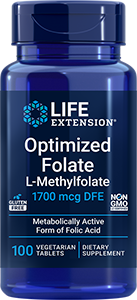
Does Folic Acid Have Benefits for Men?
Published: November 2023
You've probably heard of folic acid at one point, or seen it listed in the ingredients for a multivitamin. It has a well-deserved reputation as a must-have for pregnant women and the developing infant. But folic acid isn't just for moms-to-be. In fact, it can help support a variety of needs for both men and women—including brain and heart function, and sexual health.
With all that in mind, you may be wondering if there are any male-specific benefits to taking folic acid supplements. Does the science really suggest the benefits of folic acid are all they're cracked up to be, or is there more to the story? We'll break it down for you in this piece.
What is folic acid?
First, we should disambiguate the terms folate and folic acid, which are easy to confuse. Both are a form of vitamin B9, which is critical for metabolizing DNA and a number of crucial amino acids (a task it shares with the other B vitamins). It's also necessary for a process called one-carbon metabolism, which is important for overall cell function; this vitamin even plays a role in producing new cells.
Here's where folate and folic acid differ:
- Folate occurs naturally in many foods. It is also available in its active form in certain folate supplements.
- Folic is a synthetic form of folate that appears in fortified foods and various folic acid supplements. On its own, folic acid is metabolically inactive, which means the body must go through a process to convert it to the "active" form it can use.
Worth noting: Your body's ability to metabolize this vitamin is influenced by the presence of genetic variations, particularly those found in the methylenetetrahydrofolate reductase (MTHFR) gene. To put it more simply, if you have a certain variant of this gene, you won't be able to metabolize folate well, so not just any folic acid supplement will work for you. Instead, you'll need to take folate supplements that provide vitamin B9 in their bioavailable forms—including L-methylfolate (5-MTHF) or L-5-methyltetrahydrofolate—to get what you need. If you aren't sure if you carry at least one variant of the MTHFR gene, you may want to test for it.
Is folic acid good for men?
The short answer is, "yes!" Does folic acid or folate offer distinct benefits for men? The truth is, while folic acid can have a positive impact on men's sexual and overall health, it's really something that can be good for the well-being of both men and women.
3 key benefits of folic acid for men (and women!)
In the next few sections, we'll talk about specific ways in which folate supplements contribute to the health of the heart, brain, and reproductive system.
1. Folic acid for heart health
It turns out that having a "hearty" amount of folate intake—especially alongside B vitamins like vitamin B12—may have benefits for cardiovascular health. Understanding why this is requires us to first understand homocysteine, so let's start there.
Homocysteine is an amino acid that the body uses to make proteins, and it's an important biomarker of good cardiovascular health. An observational study conducted in Amsterdam found that homocysteine blood levels were inversely associated with heart health in men—lower, healthy levels were correlated with healthy hearts, and vice versa (but note that the same was not true for women).
Additional studies have shown that folic acid supplementation can support healthy homocysteine blood levels and healthy antioxidant capacity, both of which promote overall heart health. Individuals given just five milligrams of folic acid a day not only significantly raised folate levels but also supported healthy homocysteine levels and vitamin B12 levels (another one of those B vitamins).
If we pull back a bit to discuss the broader cardiovascular system, we can see that folate intake is important as well. A deficiency in either folate or vitamin B12 can impact your sleep, mood and brain health. Supplementing with vitamin B12 and folate can ensure you're getting enough to maintain good health.
2. Folic acid may benefit the brain
Maintaining healthy levels of homocysteine may not only be good for heart health but may also be good for brain health. Folic acid is "brain food," so to speak, and recent studies have accordingly suggested that it could help promote healthy cognitive function and fight age-related cognitive decline. This means folic acid can play a role in healthy aging.
A systematic review found an association between homocysteine levels and age-related cognitive decline, suggesting that maintaining optimal levels of this amino acid may help support cognitive function. What's more, the study also found that low levels of folic acid, vitamin B12 and potentially vitamin B6 may play a role in this association. This would imply that proper folic acid supplementation can help promote healthy homocysteine levels and healthy cognition in older adults.
While the results from studies like these are very promising, especially when it comes to maintaining healthy homocysteine levels, the connection between folate and brain health remains too tenuous to draw firm conclusions. Further research is needed before we can say anything with conviction.
Explore Our Best Men's Health Supplements
3. Folate for sexual and reproductive health
Maintaining optimal sexual health can sometimes be an emotionally taxing journey. Is sexual health something folic acid supplements can help with? Research suggests that it might be! When taken with zinc, folic acid can encourage both a healthy sperm count and sperm morphology. This would be extremely beneficial for men who are actively looking to conceive—especially given how easy it is to supplement with folic acid.
Some men may want to explore dietary supplements to promote sexual health prior to turning to other options, and this is where folic acid and B vitamins can prove helpful.
Is Folate Good for Pregnant Women?
For pregnant women or women looking to become pregnant, folate supplementation is well recognized as a key component of prenatal care. Folate can play a role in supporting a healthy pregnancy and birth. This is especially important for women with specific variants of the MTHFR gene, who have more trouble converting folic acid into usable benefits in the body.
Taking folic acid—or metabolically similar derivatives like 5-methyltetrahydrofolate—can support your chances of successfully conceiving. Child-bearing women, or those trying to become pregnant, are encouraged to get at least 400 micrograms (0.4 milligrams) of folic acid daily, from multivitamins, folate-rich foods, or other sources. Studies suggest that folate at these dosages can support the likelihood of a healthy pregnancy and birth.
Additionally, when it comes to red blood cells, women in particular should be mindful of their folate levels. Deficiencies of B vitamins like vitamin B12 or folate are more common in women of child-bearing age than in men, and supplementation in large amounts can help fill in dietary gaps.
Should folic acid be taken every day?
The answer is yes! It's important to fortify your body with enough daily folate intake and folic acid, through either fortified food, multivitamins, or supplements. This will ensure that you're getting the recommended dietary amount of at least 400 micrograms (mcg).
The reason daily supplementation is advisable is that folic acid—like vitamin B12, vitamin B9, and all other B-complex vitamins—is water soluble. This means that the body excretes it through urine, and since the body is unable to create its own folate, it's important to ensure you're continuously consuming large amounts of it through food or folic acid supplements.
The recommended dose of folic acid supplements for adults is 400 mcg DFE (Dietary Folate Equivalents), but this folate level is widely believed to be too low and you might therefore need larger amounts. There are high-dose formulas that can provide you with either 1700 mcg DFE, or 8500 mcg DFE, for example.
Where can you find folic acid?
Food is our main source of vitamins and important minerals, and vitamin B9/folate is found in a variety of both the natural and folate-fortified foods we consume on a daily basis.
Some examples of folate-rich foods include:
- Leafy green vegetables
- Fruits (including avocado)
- Dried beans, peas, and nuts
- Breads, cereals, and other grain products that are "enriched" (i.e., have folic acid fortification)
Unfortunately, consuming folate-rich foods won't always guarantee you're hitting the right folate levels; it's unstable in food, and you might need to find a way of getting larger amounts of it. Sometimes, cooking fruits and veggies or storing them at room temperature can significantly reduce folate levels, as it is sensitive to light and heat.
This is where folic acid supplementation can make a meaningful impact—and ensure you don't have to worry about falling short of your daily intake goal. If you are unsure how much folate to take, be sure to consult your doctor to determine if you may need additional folic acid supplementation for your health needs.
Folic acid is a powerful and essential nutrient that serves a wide range of health needs, and research is just beginning to scratch the surface of its many benefits.
About the Author: Trent Fowler has been covering health and wellness for more than a decade. A technical writer and content specialist, he is also the co-host of the Futurati Podcast and writes about fintech, AI, and other emerging technologies.
References
- Aghamohammadi V, et al. "Effect of folic acid supplementation on homocysteine, serum total antioxidant capacity, and malondialdehyde in patients with type 2 diabetes mellitus." J Am Coll Nutr. June 2011. https://pubmed.ncbi.nlm.nih.gov/21896879/
- Azizollahi G, et al. "Effects of supplement therapy on sperm parameters, protamine content and acrosomal integrity of varicocelectomized subjects." J Assist Reprod Genet. April 2013. https://pubmed.ncbi.nlm.nih.gov/23435530/
- Hornstra JM, et al. "Homocysteine levels are inversely associated with capillary density in men, not in premenopausal women." Eur J Clin Invest. 2014. https://pubmed.ncbi.nlm.nih.gov/24422875/
- Levasseur J, et al. "Getting the Right Amount of Folic Acid." https://www.center4research.org/getting-right-amount-folic-acid/
- Miraglia N, Dehay E. "Folate Supplementation in Fertility and Pregnancy: The Advantages of (6S)5-Methyltetrahydrofolate." Altern Ther Health Med. May 2022. https://pubmed.ncbi.nlm.nih.gov/35653630/
- Piertrzik, Klaus, et al. "Folic acid and L-5-methyltetrahydrofolate: comparison of clinical pharmacokinetics and pharmacodynamics." Clin Pharmacokinet. August 2010. https://pubmed.ncbi.nlm.nih.gov/20608755/
- Van Dam F, Van Gool WA. "Hyperhomocysteinemia and Alzheimer's disease: A systematic review." Arch Gerontol Geriatr. May 2009. https://pubmed.ncbi.nlm.nih.gov/18479766/
- "B Vitamins." Harvard T.H. Chan School of Public Health. March 2023. https://www.hsph.harvard.edu/nutritionsource/vitamins/vitamin-b/
- "Folate." Data on file.
- "Folate." National Institutes of Health. November 2022. https://ods.od.nih.gov/factsheets/Folate-HealthProfessional/
- "Folic Acid." Centers for Disease Control and Prevention. June 2022. https://www.cdc.gov/ncbddd/folicacid/about.html
- "Folic Acid." Medline Plus. https://medlineplus.gov/folicacid.html
- "Folic acid." Office on Women's Health. February 2021. https://www.womenshealth.gov/a-z-topics/folic-acid
Always be in the know!
Access the latest deals, wellness news, expert health tips & more!









